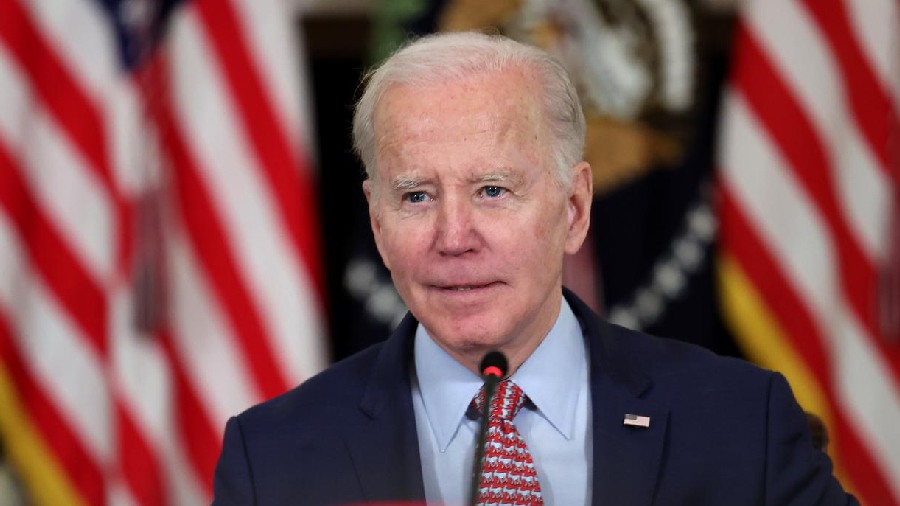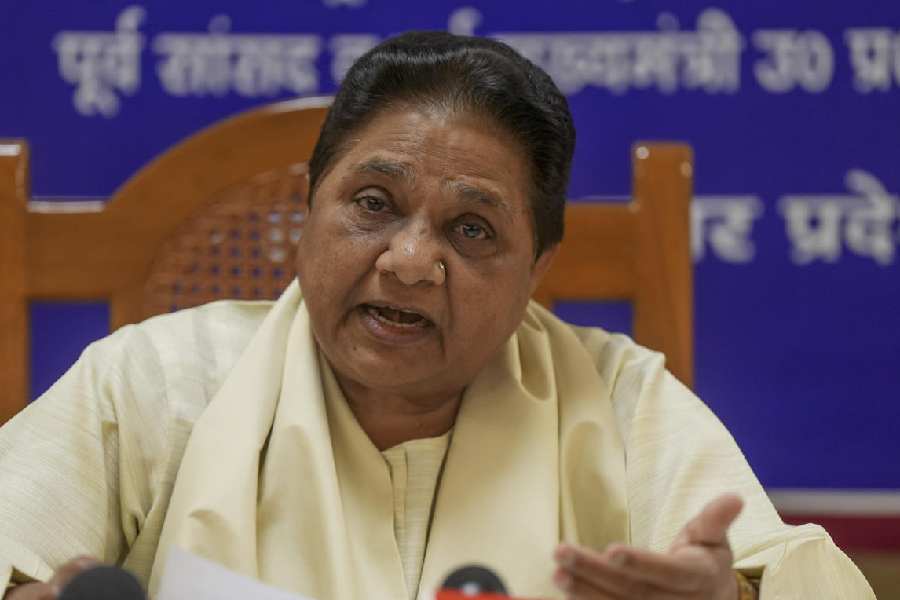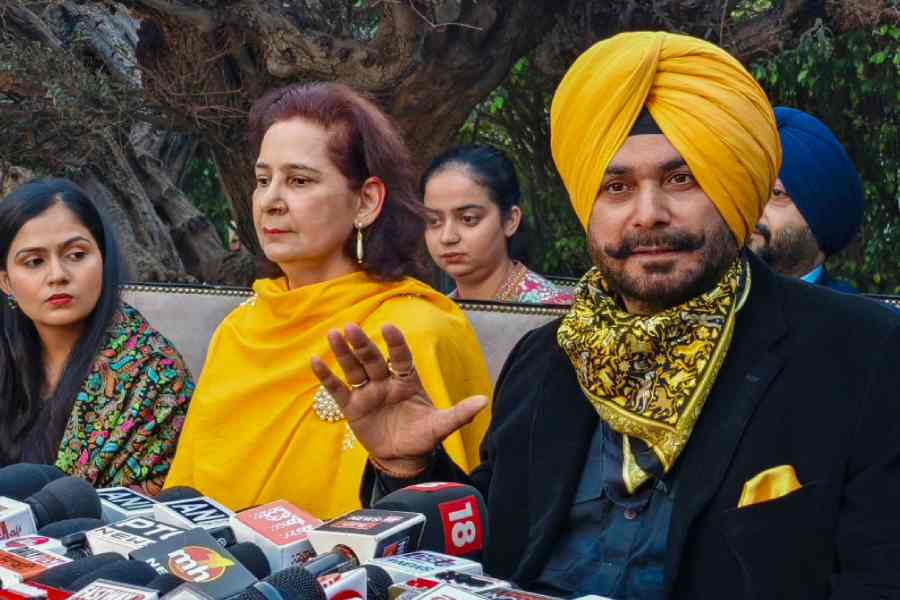President Joe Biden formally announced on Tuesday that he would seek a second term, arguing that American democracy still faces a profound threat from former President Donald Trump as he set up the possibility of a climactic rematch between the two next year.
In a video flashing images of a mob of Trump supporters storming the Capitol on Jan. 6, 2021, the president said that the “fight for our democracy” has “been the work of my first term” but is incomplete while his predecessor mounts a comeback campaign for his old office that Biden suggested would endanger fundamental rights.
“Around the country, MAGA extremists are lining up to take on those bedrock freedoms away,” Biden said, using Trump’s Make America Great Again slogan to describe the former president’s allies. “Cutting Social Security that you’ve paid for your entire life while cutting taxes for the very wealthy. Dictating what health care decisions women can make, banning books and telling people who they can love. All while making it more difficult for you to be able to vote.
“When I ran for president four years ago,” he added, “I said we were in a battle for the soul of America. And we still are.”
The official declaration finally ended any lingering suspense over Biden’s intentions and effectively cleared the way to another nomination for the president, barring unforeseen developments. While he had repeatedly and consistently said he intended to run, Biden stoked renewed speculation by delaying his kickoff for months. Now his team can assemble the formal structure of a campaign organization and raise money to finance it.
Biden tapped Julie Chavez Rodriguez, a senior White House adviser and granddaughter of the iconic labor leader Cesar Chavez, as his campaign manager. Quentin Fulks, a Democratic operative who most recently ran Sen. Raphael Warnock’s 2022 reelection campaign in Georgia, will serve as her principal deputy. But the operation is expected to be overseen from the White House by top presidential aides.
Although he described himself as “a bridge” to the next generation during his 2020 campaign, a comment that some interpreted as a hint that he would serve only one term, Biden concluded that he was not in fact ready to hand over the torch yet. His decision was fueled in part, aides said, by his antipathy for Trump and his belief that he is the Democrat best positioned to keep the criminally indicted and twice-impeached former president from recapturing the White House.
In offering himself as a candidate again, Biden is asking Americans to trust him with the powers of the commander in chief well into his ninth decade. At age 80, Biden is already the oldest president in American history, and, if he were to win, he would be 86 at the end of a second term, nearly nine years older than Ronald Reagan was when he left the White House in 1989. Trump, no youngster at 76, would himself outlast every president by age other than Biden if he were restored to the Oval Office and finished his new term at 82.
As Biden formally kicked off his campaign, he appeared at this point to be a virtual lock to win his party’s nomination. While many Democrats had hoped he would cede to a younger candidate, no formidable challenger for the nomination has emerged. Robert F. Kennedy Jr., a son of the iconic assassinated senator and a vocal critic of vaccines, and Marianne Williamson, the self-help author whose 2020 campaign fizzled before the first votes were cast, have announced long-shot bids but pose little evident threat to the incumbent president.
If Biden and Trump square off again next year, it would be the first time that the same nominees faced each other in consecutive presidential elections since 1956, when Dwight D. Eisenhower beat Adlai Stevenson for the second time. It would also be the first time a president was challenged by his predecessor since Theodore Roosevelt attempted a comeback in 1912 against his handpicked successor, William Howard Taft, in a three-way campaign won by Woodrow Wilson.
While Biden presides over a more unified party than his potential challenger does, many Democrats privately worry that the president may not be up to another campaign. His overall approval rating remains mired at just over 42% , according to an aggregation of polls by the political website FiveThirtyEight, lower than 10 of the last 13 presidents at this point in their terms.
While polls show that most Democrats have favorable opinions about Biden, a majority of them would still rather he not run again. In a survey by NBC News released this week, 70% of Americans, including 51% of Democrats, said he should not seek a second term. Seven out of 10 of those who did not want him to serve four more years cited his age as a factor.
Biden and Trump face a strikingly competitive race, with recent polls by Yahoo News, The Wall Street Journal and Morning Consult showing the president slightly ahead while surveys by The Economist and the Harvard University Center for American Political Studies find him trailing by several points. Biden faces similarly mixed results against Gov. Ron DeSantis of Florida, the strongest challenger to Trump for the Republican nomination.
Biden’s announcement represented the latest improbable chapter in a long life in public office, the fourth time he has thrown his hat in the presidential ring and presumably the last campaign of a half-century-plus career that began with his election to the New Castle County Council in 1970.
Over the course of 36 years in the Senate, eight years as vice president and campaigns for the White House in 1988, 2008 and 2020, Biden has become one of the most familiar faces in American life, known for his resilience in adversity as well as his habitual gaffes. And yet the avuncular, backslapping, work-across-the-aisle deal maker has struggled to translate decades of goodwill into the unifying presidency he promised.
Working with the narrowest of partisan margins in Congress, Biden in his first two years scored some of the most ambitious legislative victories of any modern president, including a $1.9 trillion COVID-19 relief package; a $1 trillion program to rebuild the nation’s roads, highways, airports and other infrastructure; and major investments to combat climate change, lower prescription drug costs for seniors, treat veterans exposed to toxic burn pits and build up the nation’s semiconductor industry. Some of those bills passed with Republican votes.
Along the way, he has revitalized international alliances that had frayed under Trump, rallying NATO and other partners around the world to stand against Russia’s unprovoked invasion of Ukraine. With bipartisan support, he has committed more than $100 billion to arm Ukraine’s military and help its government and people survive the Russian onslaught.
Yet his decision to withdraw forces from Afghanistan after 20 years in keeping with an agreement with the Taliban struck by Trump led to a debacle in 2021 in which the radical militants took over the country, fleeing Afghans swarmed U.S. airplanes taking off from Kabul and a suicide bomber killed 13 American troops and 170 Afghans during the withdrawal.
Biden has also struggled to secure the southwestern U.S. border, where illegal migration has soared, and he has had mixed success in stabilizing the post-pandemic economy, which saw inflation rise to its highest level in four decades and gas prices shoot up to record levels. While both have begun to come back down and unemployment is near historic lows, many Americans remain unsettled by economic anxiety.
Perhaps most frustrating to Biden, his hopes to heal the rifts that widened under Trump have so far been dashed, with American society still deeply polarized and his predecessor still a potent force in stirring the forces of division and emboldening white supremacists and antisemites.
The president’s critics say that Biden is the one who is divisive because of his attacks on Trump’s “ultra-MAGA Republicans,” and they portray him as a socialist bent on destroying the country. Regardless of whom they nominate, Republicans expect to challenge Biden next year by linking him to the nation’s economic troubles and depicting him as a feckless leader held captive by his party’s activist left.
Except for the headline, this story has not been edited by The Telegraph Online staff and has been published from a syndicated feed.










